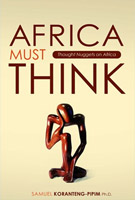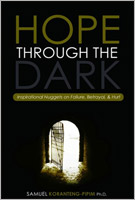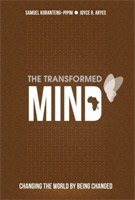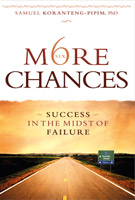Huge-IT Slider Module

SAMUEL KORANTENG-PIPIM, PH.D.
A US-based Ghanaian author, inspirational speaker, leadership trainer, and an advocate for youth empowerment.

BIBLE ANSWERS
To contemporary questions and issues.

EAGLES ONLINE
Empowerment & Advisory Group for Leadership, Excellence, & Service
He was born out of wedlock—to an interracial couple. He was put up for adoption. He dropped out of college after only six months. He was fired from the company he founded. And yet he changed the world. Though he died on October 5, 2011, he still lives in the lives of millions around the world. His name? Steve Jobs—the charismatic pioneer and innovative co-founder of Apple Computers[1].
The Three Apples
It is said there were three apples that changed the world—Eve's, Newton's, and now Jobs's. Of these, we’re more familiar with the last one. The very name of his company, Apple — with its rounded, apple fruit logo—seemed to say you cannot resist taking a bite.
Steve was only 21 when he started Apple--officially formed on April Fool's Day, 1976. He was forced out in 1985 but returned 15 years later and rescued Apple from near-bankruptcy. Two months before his death, in August of 2011, he had turned the company into the most valuable company in the world[2].
iJobs
Without doubt, Steve Jobs was one of the greatest geniuses of our time[3]. He transformed the letter “i” into the most important alphabet today. His technological product lines included the iMac, iTune, iPod, iPad, iPhone, and now the iCloud to store our data in the clouds. At his death, someone quipped about this iCon of our generation:
“Steve Jobs didn't die. He went to heaven to set up iCloud.”
There have been many inventors in history, but Jobs seems to exceed them all. Because of his transformative impact on our lives, a biography of Steve Jobs could most appropriately be titled iJobs: The Impact of One Person. His impact on culture has been summed up by Jeffery Kluger in Time Magazine (October 7, 2011)[4] :
"But it's also fair to argue that Jobs was in some ways different from other captains of industry. Henry Ford, Thomas Edison and Bill Gates changed the world too - Gates more than all of them, perhaps, with his second chapter as the world's greatest philanthropist - and yet the garment rending and candle lighting that has followed Jobs' death suggests a passion that none of the others stir up.
Perhaps it's that Gates and the rest that invented what were essentially just products - remarkable things that transformed the way we lived, but merchandise all the same. Jobs' inventions got inside not just our lives but also our heads and - improbably - our hearts. That, of course, is the way it is with living things."
iQuotes
In reflecting on Steve Jobs life and death, it is worth pondering over his own reflections on life. The following classic quotes are excerpted from his 2005 Commencement speech at Stanford University[5] :
“Getting fired from Apple was the best thing that could have ever happened to me. The heaviness of being successful was replaced by the lightness of being a beginner again, less sure about everything. It freed me to enter one of the most creative periods of my life.”
“Sometimes life hits you in the head with a brick. Don't lose faith. I'm convinced that the only thing that kept me going was that I loved what I did. You've got to find what you love. And that is as true for your work as it is for your lovers. Your work is going to fill a large part of your life, and the only way to be truly satisfied is to do what you believe is great work. And the only way to do great work is to love what you do. If you haven't found it yet, keep looking. Don't settle. As with all matters of the heart, you'll know when you find it. And, like any great relationship, it just gets better and better as the years roll on. So keep looking until you find it. Don't settle.”
"When I was 17, I read a quote that went something like: ‘If you live each day as if it was your last, someday you'll most certainly be right.' It made an impression on me, and since then, for the past 33 years, I have looked in the mirror every morning and asked myself: ‘If today were the last day of my life, would I want to do what I am about to do today?' And whenever the answer has been ‘No' for too many days in a row, I know I need to change something."
"Your time is limited, so don't waste it living someone else's life. Don't be trapped by dogma - which is living with the results of other people's thinking. Don't let the noise of others' opinions drown out your own inner voice. And most important, have the courage to follow your heart and intuition. They somehow already know what you truly want to become. Everything else is secondary."
iCrazy
After Jobs’ death the original Apple “Think Different” commercial re-surfaced. In it, images of transformative people throughout the 20th century are shown as a narrator toasts to them for changing the world. In the versions that aired on TV, the narrator is Richard Dreyfuss. But in the version below, the narrator is Steve Jobs himself. His 1997 toast reads as follows:
Here’s to the crazy ones. The misfits. The rebels. The troublemakers. The round pegs in the square holes. The ones who see things differently. They’re not fond of rules. And they have no respect for the status quo. You can quote them, disagree with them, glorify or vilify them. About the only thing you can’t do is ignore them. Because they change things. They push the human race forward. And while some may see them as the crazy ones, we see genius. Because the people who are crazy enough to think they can change the world, are the ones who do[6].
iRadical
Steve Jobs was crazy enough to think he could change the world. As a Christian, I believe it is possible. How? By being changed. The Bible nowhere says we must change or transform the world. It simply says, “Be ye transformed” (Romans 12:1, 2). But here is the secret: When we’re transformed, when we are truly changed, the world around us will be changed as well.
What Steve Jobs refers to as “crazy ones,” I call non-conformists or radicals. Biblical radicals. And as I stated in my 2010 presentation on “Radical Commitment” to a group of young people[7],
People who change the world are radicals. They refuse to go along in order to get along. They would rather die than be slaves of public opinion. The status quo labels them as controversial, extremists, and trouble-makers. And because they turn their worlds up-side-down, their names and views are often greeted with fear and dread. The time has come for our Christian commitment to be “radical”—a word whose Latin derivation means going to the root, origin, or essence of a thing. If the Bible is true, if our message is the Truth, if the “signs of the times” mean anything, and if “revival and reformation” are possible, then we must be radical for the Lord. The time has come for us to be ashamed of our superficial religious experience, mediocre performance, waffling positions, and the cheap vanilla faith that costs us nothing. Unless we’re radically committed to the Lord and His Word, our profession is empty sloganeering. “Radical commitment” is a call to Christian nonconformity. It’s a plea to stand out and be counter-cultural. It is a challenge to be real—to practice what we profess. Anything less would be unbiblical, irrational, and irrelevant—if not a betrayal.
It’s time to be radical! Let’s change our world by being changed. All it takes is an “i.” One person. You. Me.
Reflections by iPipim
(c) Samuel Koranteng-Pipim, PhD
Ann Arbor, Michigan
Endnotes
1. Steve Job was born on February 24, 1955. At the time of his birth, both parents were graduate students. Job’s father, Abdulfattah John Jandali, was a Syrian and his mother (Joanne Carole Schieble [later Simpson]), was an American of Swiss and German ancestry. Jobs was placed for adoption after his mother’s (Schieble's) father opposed their marriage. His biological parents Jandali and Schieble married in December 1955, four months after her father died and ten months after giving up their baby boy. The parents divorced in 1962.
2. http://www.huffingtonpost.com/2011/08/11/apple-vs-exxon-the-battle_n_924764.html.
3. At the time of his death, he was widely described as a visionary, pioneer and genius—perhaps one of the foremost—in the field of business, innovation, and product design, and a man who had profoundly changed the face of the modern world. As of October 9, 2011, Jobs was listed as either primary inventor or co-inventor in 342 US patents or patent applications related to a range of technologies from actual computer and portable devices to user interfaces (including touch-based), speakers, keyboards, power adapters, staircases, clasps, sleeves, lanyards and packages.
4. Jeffrey Kluger, “They're Alive! Why Apple Products Are Irresistible” Time Magazine (Oct. 07, 2011); http://www.time.com/time/health/article/0,8599,2096397,00.html#ixzz1a7xTmpee.
5. http://news.stanford.edu/news/2005/june15/jobs-061505.html.
6. http://appadvice.com/appnn/2011/10/petition-asks-apple-to-air-steve-jobs-narrated-crazy-ones-ad.
7. https://www.audioverse.org/english/sermons/presenters/podcast/121/latest/samuel-pipim.xml.






